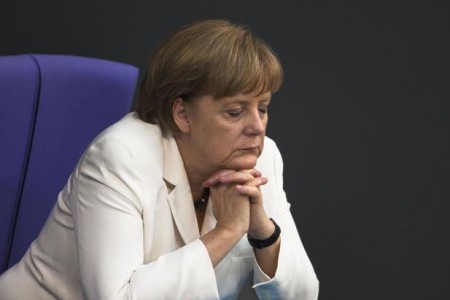The troubled Europe
While leaders at the mainland Europe take one more step towards creating a full scale banking union, not a troubled nation like Greece but a stable nation like United Kingdom is talking a breakaway from the union.
Earlier, Greek communist party, which emerged as second biggest party in the latest election, had warned to reject the EU bail out offer and move out of the union if it wins the election. As UK now joins the race, it appears, EU not only needed economic solution but political too. Germany is under pressure to give a solution of all these.
UK Prime Minister David Cameron in an article published on Sunday Telegraph said he is ready to hold referendum on whether to end relationship with European Union, but not in haste. Over 100 MPs had recently asked Prime Minister Cameron to legalise the procedure of holding referendum on relation with EU in the next parliamentary election.

UK has always remained inactive member of the union. The economic crisis in the region never spilled over to UK. Despite most nations in the union accepted monetary union, UK has avoided.
Now, as trouble flame widens in the region, UK is mulling to move away from its responsibilities.
Cameron writes, “There is more to come – further moves, probably further treaties – where we can take forward our interests, safeguard the single market and stay out of a federal Europe.
Back in mainland Europe, UK is lending no hands in resolving the economic crisis that has adversely affected the union since few years. Instead, powerful economies like Germany, Italy and France are active in finding solution of the crisis. The acceptable solution of the crisis will spare the union from possible breakaway. Though critics say, it was the result of not well managed monetary union, the leaders here are making all efforts to tighten the economic policies and plans in the union. Efforts are being made to drive the union out of crisis at the earliest possible.
The last minute skills shown by Italian Prime Minister Mario Monti, in the wee hours of marathon session in Brussels, has given some hopes for bailout of the trouble economy. Monti teamed up with the leaders of France and Spain to extract some important concessions from Europe’s biggest creditor nation, Germany.
Under new agreement, Italy and Spain will have an easier time qualifying for aid from the European Stability Mechanism, the permanent bailout fund that goes into operation from today. Countries that comply with existing economic-policy recommendations will be eligible for aid without having to fulfil any extra conditions. That’s less onerous than the conditions that Greece, Portugal, and Ireland had to meet to get bailouts.
Similarly the European Stability Mechanism will be able to put money into Spanish banks directly, rather than having to filter it through the Spanish government after the creation of a European-wide banking supervisor.